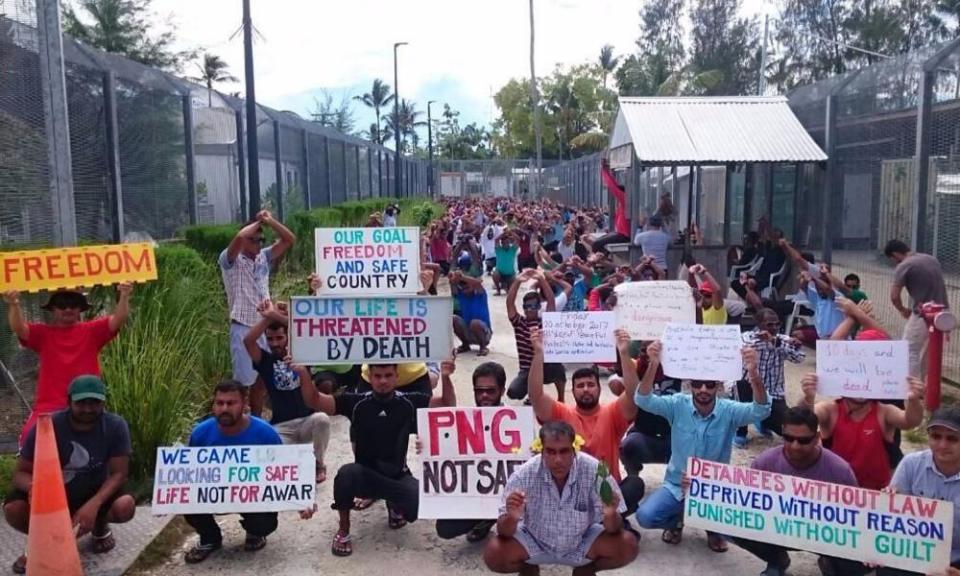UK offshore detention proposal could create 'human rights disaster', Australian experts warn

A Downing Street plan to consider emulating Australia’s offshore detention system for asylum seekers risks creating a fresh “human rights disaster”, experts familiar with the immigration policy have said.
On Wednesday, the Guardian reported that documents from the Foreign Office revealed Downing St had sought its advice on “negotiating an offshore asylum processing facility similar to the Australian model in Papua New Guinea and Nauru”.
For more than eight years Australia sent all asylum seekers who arrived in its territory by boat to purpose-built facilities in the two Pacific nations, under financial agreements struck with their governments.
Related: Revealed: No 10 explores sending asylum seekers to Moldova, Morocco and Papua New Guinea
The policy has consistently drawn worldwide condemnation from governments, legal groups, United Nations bodies, and human rights NGOs for its radical lack of transparency and documented failures including human rights abuses and flouting of international law.
It damaged democracy in Australia. You’re not just doing this to refugees. You’re damaging the values and principles of your country
Behrouz Boochani, Kurdish former detainee
At least a dozen people died in Australia’s offshore detention network, while thousands of others suffered through an epidemic of mental illness and self harm, and on Good Friday 2017, a shooting by drunk PNG soldiers. That same year the Australian government was ordered to pay more than $70m in compensation to almost 2,000 detainees.
Elaine Pearson, Australia director of Human Rights Watch, said the Australian experience of offshore processing “has been a human rights disaster” that was still causing suffering.
“Prolonged and indefinite detention has driven people to the breaking point, with alarming levels of trauma, depression and other mental health conditions,” she said. “Australia’s harsh refugee policy is no global model.”
Kurdish journalist, author, and former detainee Behrouz Boochani spent more than seven years on Manus Island, most of that in the prison-like detention centre before being moved to “open” – but still guarded – accommodation.
Related: Behrouz Boochani, brutalised but not beaten by Manus, says simply: 'I did my best'
He said the UK should take heed of what such a move would mean not just for people who have sought its protection, but for the future of their country.
“What the Australian government has done damaged the reputation and credit and political culture of Australia,” Boochani told the Guardian. “It damaged democracy in Australia. You’re not just doing this to refugees. You’re damaging the values and principles of your country.”
Boochani said it was impossible to improve the Australian model because at its core it “banished people” and deprived them of access to basic human rights.
“What the Australian government has done really didn’t work. It will remain in the history of Australia forever. Those countries looking at Australia as an example should think about this.”
The Foreign Office documents suggested department officials were pushing back, noting PNG’s chronically under-resourced and fragile public health system, and a warning that it would “renew scrutiny of Australia’s own offshore processing”. One document added: “Politically, we judge the chances of positive engagement with the government on this to be almost nil.”
The PNG government told the Guardian it had not been approached by any UK representative yet.
Graham Thom, from Amnesty International Australia, said part of the issue with Australia’s system was “there is no endgame”. When it signed the deal, PNG wasn’t expecting the refugees to permanently settle in their country, and Australia failed to find a third-party option.
“That’s why we had the US deal [to take Australia’s refugees], but the UK aren’t likely to get a US deal,” Thom said. “So who would take these people if they’re transferred to PNG? That’s the same question Moldova and Morocco would ask.”
Australia still has asylum seekers offshore, and hundreds have ended up in Australia for medical treatment, with the government “scrambling for a solution” after paying exorbitant costs, Thom said.
“It’s in breach of international laws, it’s hugely expensive, and ultimately it didn’t stop anyone. It was the turnbacks that made the difference,” he said, referring to the similarly controversial policy of Australian authorities towing asylum seeker boats back into international waters, or transferring the passengers into lifeboats or fake fishing vessels.
The arrangement with Australia – which was signed by the former prime minister Peter O’Neill – soon became a sore point in the bilateral relationship. Current leader James Marape has openly criticised Australia’s system which brought little benefit to PNG and in particular the people of Manus Island.
Legally, the UK would not be able to establish a detention centre in the manner Australia did initially. In 2016 the PNG supreme court found it to be unconstitutional and ordered it closed. The closure and process of transferring detainees to new accommodation blocks devolved into a brutal 24-day standoff which ended with PNG police officers beating men who refused to leave.
“We have seen the damage that the Australia government’s offshore detention regime has done to people,” said David Burke, legal director at the Human Rights Law Centre.
“The sole point of offshore detention is cruelty - it is a system that relies on devising conditions that are worse than the harm that refugees are fleeing.”

 Yahoo Finance
Yahoo Finance 